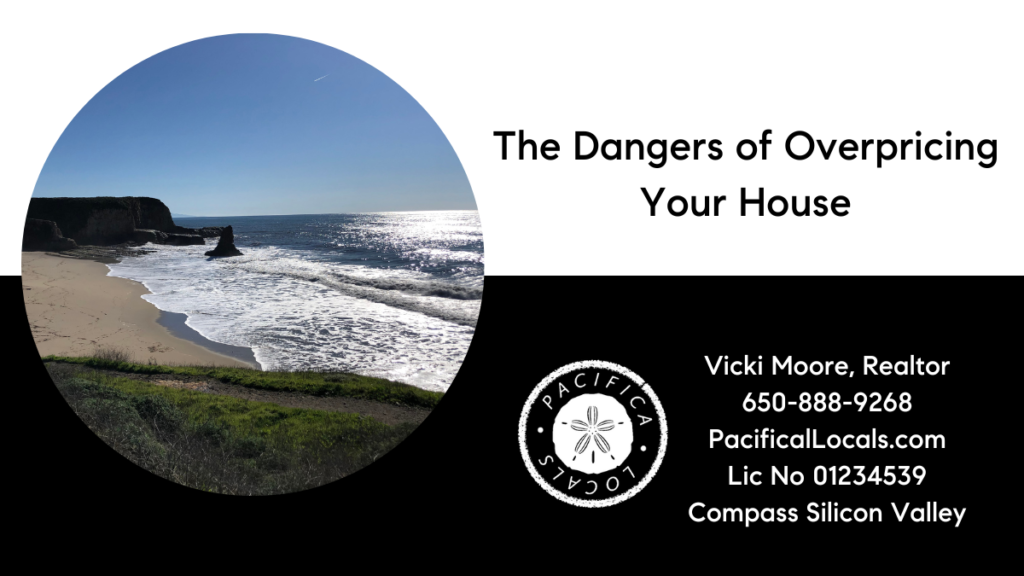The Dangers of Overpricing Your House
The dangers of overpricing your house almost always has negative ramifications for home sellers. Across Bay Area markets, listings that require price reductions before selling consistently take much longer to sell and sell for significantly lower than homes priced correctly. The correct calculation of “fair market value” typically has large economic consequences.
Conversely, overpriced homes can provide opportunities for buyers who carefully track time on market, price reductions (as well as homes taken off the market without selling). They react by making lower offers with terms weighed in their favor. Such buyers will almost always face reduced competition from other buyers. Often no competition which generally eliminates the need for overbidding. This allows for more aggressive negotiation of the purchase price and terms of sale.
“Ironically, instead of getting more money… (overpricing) usually stigmatizes a property and reduces the eventual sale price to less than it would have been with more realistic pricing.” House Selling for Dummies
Fair market value is that price a qualified, reasonably knowledgeable buyer is willing to pay, which a seller, not under duress, is willing to accept after the home has been properly exposed to the market.
Neither agents nor sellers determine market value: Only the market itself – willing and able buyers – establishes value. A comprehensive comparative market analysis is the best way to estimate current fair market value prior to listing the home for sale. Agent and seller then work together to create a plan – pricing, preparation, and marketing to maximize the conditions that reliably achieve the highest possible sale price.
The vast majority of buyers will not make offers on homes they consider significantly overpriced. Either they don’t want to waste their time, or are uncomfortable with possibly “offending” the seller. In any case, they simply move on to other listings.
Well-priced homes create a sense of urgency in the buyer/broker communities to act quickly with strong clean offers, and often lead to competitive bidding between buyers – which is the most likely way to increase sales price.
Overpricing wastes the optimum moment of buyer and broker attention: When it first comes on the market. This moment cannot be recaptured.
Overpricing your home kills any sense of buyer urgency and take much longer to sell, which then significantly reduces value in buyers’ minds. “There must be something wrong with it if it hasn’t sold by now.” It almost always eliminates the possibility of competitive bidding.
Overpricing helps sell competitive properties, since they stand out as good values in comparison.
If a listing has inadvertently been overpriced (or market conditions suddenly, cool), the sooner it is recognized as such. If the price is adjusted, there will be a smaller negative impact. Price reductions must be big enough to regain the attention of buyers and their agents. Typically at least 5%.
In order to win the listing, some agent suggest a list price considerably higher than what market conditions and comparable sales justify. They believe this is what the seller wants to hear. This is called “buying the listing.” It’s a violation of the fiduciary duty of honesty that an agent owes their client. But it doesn’t stop agents from doing it.
Pricing Your Property Properly
- Price it right to begin with.
- Prepare the home to show in its best possible light.
- Implement the most comprehensive marketing plan possible.
- Hire an agent who knows how to negotiate effectively on your behalf, and manage the disclosure and due diligence processes.
In the Bay Area, the difference can add up to tens or even hundreds of thousands of dollars.
Summary
Using data on 150,000 homes over 12 to 24 month periods, we performed analyses such as this one on 5 Bay Area Regions comprising 10 counties. The specific results varied by market region. But large differences in sales-price-to-original-list-price percentages and average days-on-market between homes that sold without price reduction. And those selling after price reduction were universal, which is to be expected.
The calculations regarding the value differentials between these sales must be considered approximate: The same home can’t be sold at the same point in time at different list prices, with and without price reductions to compare the results. But in all the regional analyses we performed comparing the two types of sale, the change in value – i.e. the average loss in value see in price reduced homes – ranged from 6% to 8%. Certainly this differential varies widely amid tens of thousands of individual homes in varying circumstances of sale. But it seems clear that the decline in value is significant. Considering home prices in the Bay Area, even a 3% to 4% decline, adds up to a loss of tens of thousands of dollars in seller proceeds. Besides the much longer period necessary to realize the sale.
Pertaining to residential real estate sales in Santa Clara and San Mateo Counties. Analysis performed in good faith with data from sources deemed reliable, but may contain errors and subject to revision. All numbers should be considered approximate How these analyses apply to any specific property is unknown.
Compass Analysis
